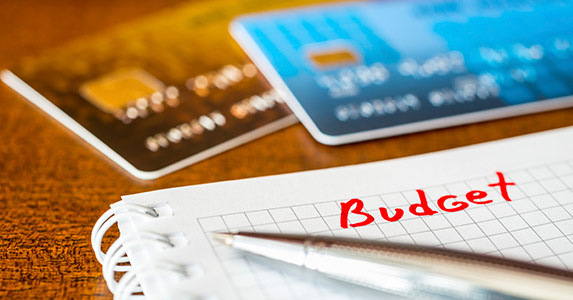Budgets and Why You Need One
Unless you’re independently wealthy, you need a budget. Even if you make more than you spend – congratulations on that, by the way – a budget will help you target areas where you could be saving for fun things like vacations, important things like your kids’ college, and vital things like retirement. You need to actively look for the best budget product deals out there to make a saving.
There is an unlimited number of tools, and tons of apps and software available for creating and sticking to a budget, such as Mint and YNAB. While these are helpful, your budget doesn’t have to be complex to be effective. A budget is basically a tool – an essential one – that helps you live within your means by using your income to meet your financial responsibilities first, and then identifying when and where you can spurge with any “excess” income.
To create a workable budget you need to identify the following:
- How much money do I have coming in and when?
- What bills do I have and when are they due?
- How much money am I spending and on what?
- How much can I afford to save?
- Am I spending more than I make?
If the answer to question 5 is “yes” then a budget will help you solve that problem and put you on the road toward smart money management.

Why Credit Cards are Great Budgeting Tools
If you are disciplined and committed to making sound financial decisions, a credit card is agreat tool for your budgeting needs. They offer some excellent features for meeting your budgeting goals and provide advantages over the use of cash and debit cards.
- Detailed monthly Itemized spending – In order for your budget to work, you need to keep track of all of your spending. This helps you identify problem areas and opportunities for greater savings. Many card issuers even categorize your spending.
- Builds good credit – Using your credit card responsibly and not carrying a balance boosts your credit score.
- Rewards cards – They give you a little something back, when you use them wisely.
- Extra Advantages – Many credit cards offer additional consumer safeguards when you make purchases with your card, such as purchase protection, extended warranties, protection against loss or damage, price protection and more.
Why Good Credit Matters
So, you understand why you need a budget and you realize that using a credit card for your budgeting needs helps you with your credit history and credit score. But why does that matter? Most likely, you recognize that good credit is good to have. However, you may not appreciate just how many ways credit impacts your life.
Where Credit Counts:
- Huge Expenditures – It’s likely the only way you can purchase a house, a new vehicle, tuition for college or other higher education, large appliances and other large purchases/expenses.
- Leasing a vehicle – The credit requirements for leasing a vehicle are typically higher than those needed to purchase a vehicle on credit.
- Credit Terms and Conditions – The better your credit, the better credit offers you will receive, with lower APRs, better rewards, and more incentives.
- Utilities – Many utility companies – such as gas, water, electric and cable – will waive a deposit fee if you have good credit.
- Cell Phones – If you’re looking for a new cell phone contract, your credit history plays a big role.
- Renting a place to live – Most landlords and nearly all property managers and rental companies run a credit check before they will rent to you. And if the area where you are looking to rent has a shortage of affordable rentals, your credit score will play an even bigger role in landing that dream apartment, condo, townhome or house rental.
- Employment – An increasing number of employers require a background check and use an applicant’s credit score as a factor in their hiring decisions.
- Insurance – Many insurance companies use credit-based insurance scores as a factor when determining your eligibility and rates.

Financial Activities that Impact your Credit Score
Smart financial activities and money management help you achieve and maintain a good credit score. Budgeting will help you in all of these areas. Credit cards can also help you build credit if you don’t yet have a credit history.
Paying your bills: Obviously, paying your bills on time is good for your credit. If you have a rocky payment history, things like frequency of late payments and how late the payments were makes a difference.
Balances: Carrying balances affects how much you owe and how much credit you still have available to you. For a good credit score, you want to keep your balances low and your available credit high.
Leases and rent payments: If you default on your lease, the rental company will likely pursue the unpaid remainder through a court judgment and/or a collection agency, both of which will then show up on your credit report, negatively impacting your credit score.
Making timely rent payments can now help boost your score as well in some situations. Experian and TransUnion are working with RentTrack to incorporate rent payments into credit scores. Additionally, Experian RentBureau and TransUnion’s ResidentCredit may help your credit scores with these bureaus when you or your landlord participates in these programs.
Securing different types of credit: Credit bureaus look at the variety of debt you have, such as credit cards, car payments, installment loans and student loans. A little variety is good. Too much debt is bad.
Using Rewards Cards for Smart Financing within Your Budget
Using rewards credit cards for everyday purchases can help you save money, get some good deals and take advantage of extra promotions. However, you must exercise self-control to ensure you get maximum rewards without overspending and detrimentally impacting your credit. Make a plan and stick to it. If you have a history of irresponsibility with credit cards, this option is not for you!
If you are confident that you can use your credit card for budgeted expenses only, then a rewards credit card will give you a little extra bang for your buck. Choose a card with a good cash back rate on the rewards most important to you.
- Whenever possible, use your rewards card for your normal monthly expenses, instead of cash, debits cards or checks.
o Groceries
o Utilities
o Gas
o Car Insurance
o Entertainment
o Dining out
o Cell phone
o Cable
o Internet
o Gifts
- Set up a “credit card payment account” with your bank. Funnel the income you have budgeted for normal expense into this account so that you pay your card balance on time, every month.
- Review your credit card transactions on a regular basis – weekly or bi-weekly.
- Set a monthly limit and adjust your spending to remain within this budgeted amount when you do your regular reviews.

Pitfalls to Avoid When Using Credit Cards as a Budgeting Tool
(Or at all)
Balances: Don’t do it. Period. When using credit cards to pay everyday expenses, you absolutely cannot carry a balance. The resulting interest you will be charged and the hit your credit will take completely wipes out all the benefits of budgeting, paying bills and reaping rewards with your credit cards.
Overspending: Only spend what you can afford. Your outgoing must not exceed your incoming.
Using your card for emergencies: Don’t charge emergency expenses, such as a broken appliance or an unanticipated car repair. to your credit card. Instead, set up an emergency fund and incorporate it into your budget.
Too many cards: You don’t need a bunch of credit cards. You don’t! Do some research. Choose one or two credit cards suited to your needs and use them responsibly. A stack of credit cards in your wallet leads to overspending, card balances with interest payments, a high utilization rate and the negative impact all of this has on your credit score.
No matter how you choose to budget, the important thing is to just do it. It doesn’t have to be complicated, and you can tailor your budget to your specific needs. And with a little research and strong discipline on your part, a credit card can be a very advantageous budgeting tool.







![Best Crochet Hooks for Beginners and Pros [2020 Update] best crochet books](https://www.awebtoknow.com/wp-content/uploads/2018/01/best-crochet-books-100x70.jpg)